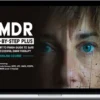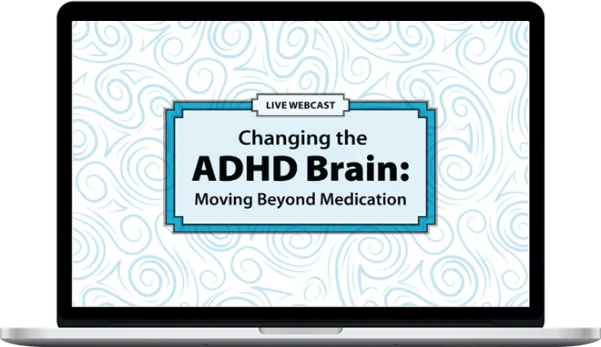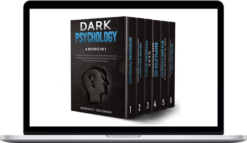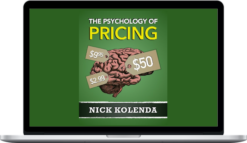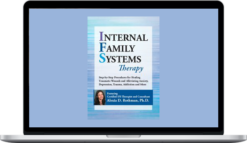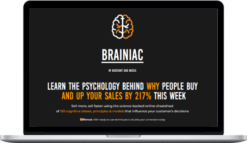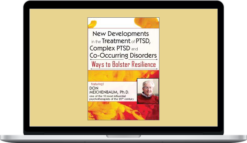David Nowell – Changing the ADHD Brain: Moving Beyond Medication
$249.99 $125.00
»Delivery: Within 21 days
Description
David Nowell – Changing the ADHD Brain: Moving Beyond Medication
Description Of Changing the ADHD Brain: Moving Beyond Medication
Many of our clients diagnosed with ADHD prefer not to take medication. There are various reasons for this including side effects and concerns with long-term use. In this training, you’ll learn more about these concerns, as well as alternative interventions for ADHD.
Viewing ADHD from a developmental perspective, we will consider the apparent increase in ADHD diagnoses over the past two decades. By understanding the way brains with and without ADHD function, you’ll be able to better identify a variety of neurodivergent-affirming strategies to significantly impact the nervous system and better manage ADHD symptoms in your clients.
Not only will you walk away with updates about evidence-based non-medication interventions for ADHD such as computerized cognitive training, mindfulness meditation, and neurofeedback, you’ll also learn a variety of practical strategies that you and your clients can implement immediately and at low cost.
We’ll navigate the vast research on exercise, movement, diet, sleep, disruptive technologies, supplements, and the impact of the environment on ADHD, summarizing the findings and applying the information to “real life”. You will finish this training with the tools and knowledge to develop a holistic approach to working with adults and children with ADHD.
What You’ll Learn In Changing the ADHD Brain: Moving Beyond Medication
Objectives
- Evaluate the relationship between the frontal lobe of the brain and ADHD symptomology for the purpose of client psychoeducation.
- Determine the impact of movement and exercise on the reduction of ADHD symptoms as it relates to assessment and treatment planning.
- Employ treatment interventions for improving impulse control and working memory in clients.
- Analyze the influence of diet and nutrition on ADHD symptoms in relation to assessment and treatment planning.
- Develop clinical strategies to calm the nervous system of clients diagnosed with ADHD.
- Assess the clinical implications of environmental influences on ADHD symptoms in clients.
Outline
Why Not Medication?
- Useful as a short-term tool
- Concerns with long-term use
- Limitations and risks
ADHD and Brain Differences
- Brain imaging evidence of ADHD
- Research regarding ADHD brain development
- Frontal lobes mature more slowly in the ADHD brain
- Excess theta brainwaves
- Implications for treatment
Neurodiversity Revolution
- Bottom up, top down interventions
- Wake up an underaroused ADHD brain
- Hyperactivity as an adaptive mechanism
- The impact of play and exercise on the brain
- Role of rhythm and timing training
Frontal Lobe/Working Memory Strategic Tools
- Use it or lose it: Increase memory, attention and focus
- Computerized cognitive training programs
- Meditation and mindfulness for ADHD
- Neurofeedback
Nutrition and Brain Health
- The impact of sugars, fats, proteins and water
- Diet and dopamine
- Omega supplementation and ADHD symptoms
- Multivitamins/minerals: Do they make a difference?
- Gluten, food additives and pesticides
ADHD and Anxiety
- ”Overaroused” subtype of ADHD
- Stress, anxiety and ADHD: the connection
- Breathwork and movement for nervous system calming
Environmental Influences
- Media plan
- Video games and social media
- Sleep deprivation
- ADHD look a likes
- Environmental toxins
The impact of time in nature on ADHD symptoms
About David Nowell
David Nowell, PhD, is a clinical neuropsychologist in private practice in Northborough, Massachusetts. He offers consultations to patients on an inpatient rehabilitation unit and is an adjunct instructor in neuropsychology to graduate students in the Clark University psychology program. He serves as a physician advisor with the University of Massachusetts Medical School Disability Evaluation Service where he was the former clinical director of the Learning Disability Assessment Program.
Dr. Nowell writes a popular blog at Psychology Today on motivation and time management and speaks internationally to clinicians on such topics as executive functioning, non-medication management of ADHD, and applying findings from Positive Psychology.
Speaker Disclosures:
Financial: Dr. David Nowell maintains a private practice and has employment relationships with Fairlawn Rehabilitation Hospital, Massachusetts Rehabilitation Commission, and Clark University. He is a presenter with TATRA Training and receives compensation. Dr. Nowell is an IME provider and receives compensation. He receives a speaking honorarium and recording royalties from PESI, Inc. He has no relevant financial relationships with ineligible organizations.
Non-financial: Dr. David Nowell is a member of the American Psychological Association, the Massachusetts Neuropsychological Association, and the International Neuropsychological Society.
More courses from the same author: David Nowell
Delivery Policy
When will I receive my course?
You will receive a link to download your course immediately or within 1 to 21 days. It depends on the product you buy, so please read the short description of the product carefully before making a purchase.
How is my course delivered?
We share courses through Google Drive, so once your order is complete, you'll receive an invitation to view the course in your email.
To avoid any delay in delivery, please provide a Google mail and enter your email address correctly in the Checkout Page.
In case you submit a wrong email address, please contact us to resend the course to the correct email.
How do I check status of my order?
Please log in to HealthcareCourse account then go to Order Page. You will find all your orders includes number, date, status and total price.
If the status is Processing: Your course is being uploaded. Please be patient and wait for us to complete your order. If your order has multiple courses and one of them has not been updated with the download link, the status of the order is also Processing.
If the status is Completed: Your course is ready for immediate download. Click "VIEW" to view details and download the course.
Where can I find my course?
Once your order is complete, a link to download the course will automatically be sent to your email.
You can also get the download link by logging into your HealthcareCourse account then going to Downloads Page.
Related products
Total sold: 4
Total sold: 2

